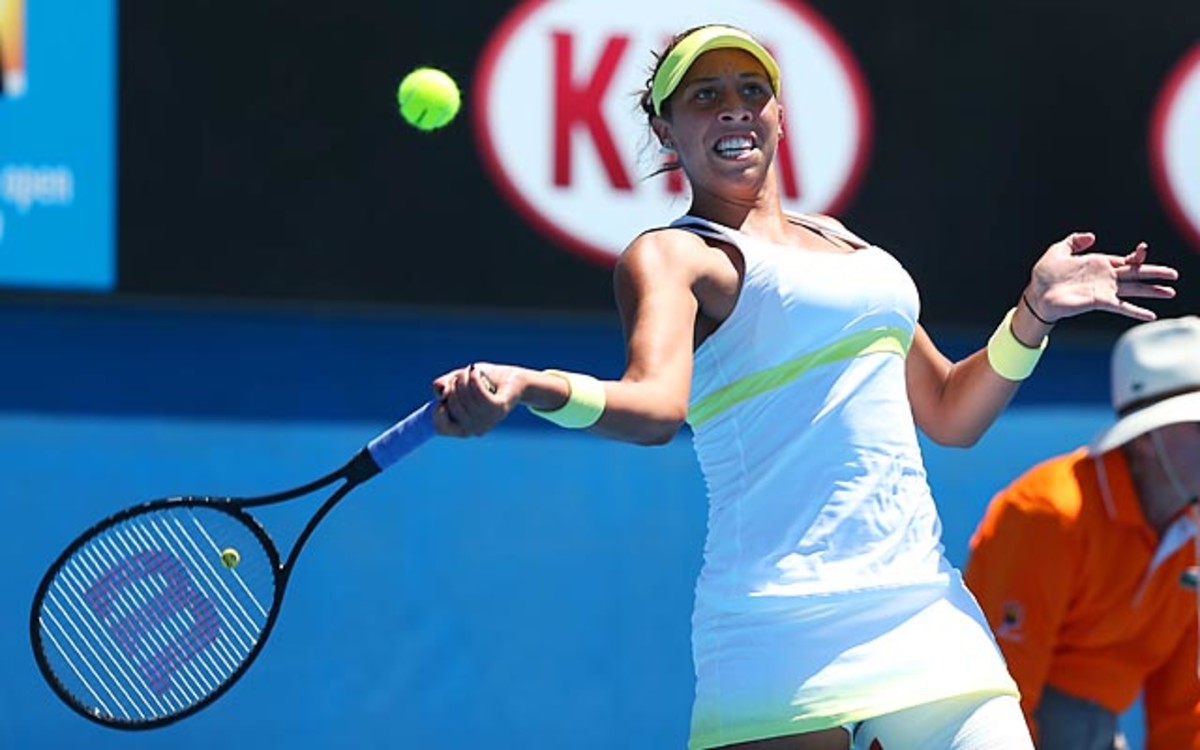
American teen Keys sprouts, as luck would have it

Madison Keys, 17, will face No. 5 Angelique Kerber in the third round after beating Tamira Paszek.
Aaron Favila/AP
At each of the four Grand Slam tournaments, the same dirge plays every year. The general media diverts its attention from the big sports, watches some tennis, eats some free food and makes a few jokes about "ovas" and grunting. And then, after a metaphorical wringing of the hands, it poses the vexing questions: "Why can't our country mine tennis talent the way it used to?"
Taken in order of event, the song's verses go like this:
When did Australia lose its tennis mojo -- so much so that in the Land of Laver and the Country of Court and the Nation of Newcombe, the prospect of (German-born) Bernard Tomic's winning one match becomes cause for celebration?
How is it that 30 years have elapsed since a Frenchman won at Roland Garros and the last French femme to win in Paris was (Canadian-born) Mary Pierce?
Why is it that, until a few months ago, the last British male to win a major predated World War II?
When will the next American male win a major -- it's been nearly a decade now, with little hope on the horizon -- and what happens when the Williams sisters retire?
This leads to a disquisition that variously touches on globalization, hunger, the appeal of team sports, inept administrators, misspent funds and the outdated idea that tennis is a country-club sport open only to the wealthy. Sometimes we even get references to chalupas (our kids eat them as they watch Honey Boo Boo; meanwhile, in Serbia and Kazakhstan, the kids are running wind sprints) and Hawk-Eye (it's bleached the character and personality out of the sport!).
Lost in the discussion is the role of luck. Oh, tennis, at its essence, is a game of skill. Guiding the ball into those boxes with a combination of power and accuracy takes talent and effort of the highest magnitude. There's a reason you never hear of pros discovering the game as teenagers or "converting" to tennis.
But luck plays a huge role in the sport's profile as well. Roger Federer recently told The Australian Associated Press about a deep disappointment he experienced as a child. His father was almost transferred to a job in Australia. Roger was 13 and looking forward to the move. When it didn't happen, Federer cried. (Federer cried? Crazy, we know.)
"I remember that period quite vividly actually and it would have been a life-changer," he said. "No doubt about it."
It would have been a game-changer for Aussie tennis, too. Some corporate middle manager in Switzerland signs off on an employee transfer ... and suddenly Australia is a tennis powerhouse again.
Likewise, in recent years we've heard about the German tennis resurgence, the boom that saw four players enter the top 20. (In this age of globalization, four top-20 players practically qualifies as dominance.) Few dwell much on this point: One of the players, Andrea Petkovic, was born in the former Yugoslavia. Another, Angelique Kerber, often trained in Poland. A third, Sabine Lisicki, has spent most of her life in the United States. It's Germany's good luck that a few immigration decisions get made differently. Otherwise, the "Where's the next Steffi Graf?" moaning would be deafening.
Then there's Madison Keys. Blasting the ball as if it owes her money, the 17-year-old American has been accumulating wins and hype in equal measure this year. In the second round of the Australian Open on Wednesday, Keys transformed a seeded opponent, No. 30 Tamira Paszek, into roadkill 6-2, 6-1. Set to crack the top 100 after the tournament despite limited WTA match play because of age-eligibility rules, Keys is already tailed by an agent, attired in Nike and being hailed as a saviorette of American tennis.
Keys grew up in Rock Island, Ill., a manufacturing town on the Mississippi. Nice place. But it's never mistaken for a tennis hotbed. Wait, Keys' parents must have played tennis, right? "Neither one can play," she said, smiling, as if envisioning her folks whiffing. "No one in my family plays tennis."
So how did she gravitate to the sport? As a small girl, she saw a tennis dress she really liked.
"My parents told me that if I played, they would buy me [a dress],'" Keys said. "I was like, 'Hey, I'll try it.' "
There you have it. The great American prospect -- the best since Serena Williams, says no less than Lindsay Davenport -- took up the sport because of her fondness for a dress. She was 4. "Complete luck," Keys said.
Luck is a funny thing. It can be a crutch. A cop-out. If it's fated or preordained and random, it absolves us of responsibility. Failure is easier to accept when it owes to a curse, not to incompetence or laziness.
No one is here to absolve various federations. No one is implying that the U.S. and Australia, especially, should be pleased by their diminished representation at the sport's highest levels. But there also ought to be an acknowledgment that a few random decisions have dramatic consequences.
The USTA -- and the other embattled federations -- devote so much time and energy and resources to finding the next Sampras, Agassi, Venus and Serena. Maybe one of the keys, pardon the pun, is simply to invest in a junior fashion department.




